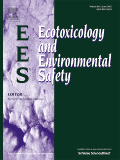
ECOTOXICOLOGY AND ENVIRONMENTAL SAFETY
Scope & Guideline
Pioneering research for a safer, healthier environment.
Introduction
Aims and Scopes
- Ecotoxicology of Chemical Pollutants:
Research examining the toxic effects of various chemical pollutants, including heavy metals, pesticides, and pharmaceuticals, on different organisms and ecosystems. - Bioremediation and Phytoremediation Strategies:
Studies focusing on the use of biological organisms, including plants and microbes, to remediate contaminated environments and improve soil health. - Environmental Health and Risk Assessment:
Assessment of the risks posed by environmental contaminants to human health and ecosystems, including epidemiological studies and biomonitoring. - Impact of Microplastics:
Research detailing the sources, distribution, and ecological effects of microplastics in various environments, particularly their interactions with living organisms. - Endocrine Disruption and Reproductive Toxicity:
Investigations into how environmental chemicals disrupt endocrine function and affect reproductive health across species. - Novel Analytical Techniques:
Development and application of innovative analytical methods for detecting and quantifying environmental pollutants, including advanced spectroscopic and chromatographic techniques. - Climate Change and Environmental Stressors:
Exploratory studies on how climate change and associated environmental stressors influence the toxicity and bioavailability of pollutants.
Trending and Emerging
- Microplastics and Their Ecotoxicological Impact:
An increase in studies investigating the effects of microplastics on aquatic and terrestrial organisms, reflecting growing concern over their prevalence and persistence in the environment. - Omics Approaches in Toxicology:
A trend towards utilizing transcriptomics, metabolomics, and proteomics to understand the biological impacts of environmental pollutants at a molecular level. - Endocrine Disrupting Chemicals (EDCs):
Heightened focus on the effects of EDCs on reproductive health and developmental processes, emphasizing their complex interactions with biological systems. - Climate Change Impacts on Toxicity:
Research exploring how climate change influences the behavior and toxicity of environmental pollutants, particularly under changing temperature and precipitation patterns. - Biological and Ecological Risk Assessment:
Emerging methodologies that integrate ecological and biological data into risk assessment frameworks, allowing for a more holistic understanding of environmental hazards. - Innovative Remediation Technologies:
Increased interest in novel bioremediation techniques, including the use of engineered microorganisms and biochar for contaminant degradation and soil health improvement. - Health Impacts of Environmental Pollution:
Growing emphasis on linking environmental exposures to specific health outcomes, particularly in vulnerable populations, through epidemiological studies.
Declining or Waning
- Traditional Chemical Risk Assessment:
There is a noticeable decrease in studies relying solely on conventional risk assessment methods, as newer methodologies incorporating multi-omics and network approaches gain prominence. - Single Pollutant Studies:
Research specifically targeting the effects of single pollutants is becoming less common, with a shift towards examining the complex interactions of multiple contaminants. - Ecotoxicological Studies on Non-Model Organisms:
Research on non-model organisms has decreased, possibly as researchers focus on more widely recognized species or model organisms that offer more straightforward experimental frameworks. - Historical Contaminants:
The focus on historical pollutants, such as legacy pesticides, appears to have waned, as attention shifts to emerging contaminants like pharmaceuticals and microplastics. - Basic Toxicological Mechanisms:
While foundational toxicological mechanisms are still important, there is a declining emphasis on purely mechanistic studies without ecological or health implications.
Similar Journals

EQA-International Journal of Environmental Quality
Exploring the nexus of human activity and environmental health.EQA-International Journal of Environmental Quality, published by the University of Bologna, Department of Agricultural Sciences, is a premier open-access journal dedicated to the multidisciplinary exploration of environmental quality issues. Established in 2009, it aims to foster a greater understanding of the intricate interactions between human activities and environmental health. With a focus on innovative research, the journal contributes to the advancement of knowledge across diverse fields, making it an essential resource for researchers, professionals, and students engaged in environmental science and sustainability. The journal operates with an emphasis on accessibility, ensuring that critical findings reach a global audience without barriers. With an impressive Scopus rank of 88 out of 171, EQA stands as a significant platform for disseminating impactful research that informs policy and promotes environmental stewardship.
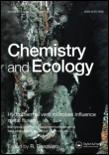
CHEMISTRY AND ECOLOGY
Innovating Environmental Solutions through ChemistryCHEMISTRY AND ECOLOGY is a prestigious academic journal published by TAYLOR & FRANCIS LTD, dedicated to advancing the interdisciplinary understanding of chemical processes in ecological systems. With an ISSN of 0275-7540 and an E-ISSN of 1029-0370, this journal has been a significant contributor to the fields of Earth and Planetary Sciences, Ecology, and Environmental Science since its inception in 1982. The journal is proudly ranked in the second quartile (Q2) in multiple categories, including Earth and Planetary Sciences and Ecology, reflecting its high impact within these disciplines. Despite not being an open-access publication, it provides valuable insights through rigorous peer-reviewed articles that explore the intricate relationships between chemical phenomena and ecological dynamics. Researchers, professionals, and students can rely on CHEMISTRY AND ECOLOGY for the latest findings and methodologies that drive innovation and understanding in environmental chemistry and ecology, enhancing their work and education in this critical area of study.
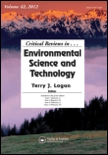
CRITICAL REVIEWS IN ENVIRONMENTAL SCIENCE AND TECHNOLOGY
Unveiling Insights for Environmental ProgressWelcome to CRITICAL REVIEWS IN ENVIRONMENTAL SCIENCE AND TECHNOLOGY, an esteemed journal published by Taylor & Francis Inc. This journal has been at the forefront of environmental research since its inception in 1993, spanning a wide range of disciplines including environmental engineering, pollution control, waste management, and water science. CRITICAL REVIEWS holds an impressive Q1 ranking in multiple categories, including Environmental Engineering and Pollution, demonstrating its critical role in advancing knowledge within the field. With a remarkable Scopus ranking—placing it in the top 1% for Environmental Science categories—this journal serves as an invaluable resource for researchers, professionals, and students alike, providing comprehensive reviews and analyses that catalyze innovative solutions to pressing environmental challenges. Though currently not open access, the journal's content is accessible through various academic platforms, ensuring that cutting-edge research is available to a global audience. Join the community of scholars dedicated to enhancing our understanding of environmental science and technology through rigorous investigation and critical discourse.

Environmental Chemistry and Ecotoxicology
Innovative solutions for ecological challenges.Environmental Chemistry and Ecotoxicology, published by KEAI PUBLISHING LTD, is a pioneering Open Access journal that has been at the forefront of research since its establishment in 2019. With an impressive trajectory that converges research excellence until 2024, the journal focuses on critical developments in the fields of environmental chemistry and ecotoxicology. It boasts a commendable market position, ranking in the top 3% among leading journals in Agricultural and Biological Sciences, Environmental Science, and related disciplines, as demonstrated by its high Scopus ranks. The journal is committed to disseminating groundbreaking research that addresses the pressing challenges of environmental sustainability and chemical safety, making it an essential resource for researchers, professionals, and students aiming to navigate the complexities of our ecological landscapes. By embracing an Open Access model, the journal ensures that valuable insights are accessible to a global audience, fostering collaboration and innovation in the field.
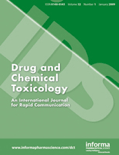
DRUG AND CHEMICAL TOXICOLOGY
Illuminating the path to chemical health and safety.Drug and Chemical Toxicology is a well-respected journal in the fields of toxicology, pharmacology, and public health, published by Taylor & Francis Ltd. Since its inception in 1978, this journal has diligently explored the effects and mechanisms of chemical exposures on health and the environment, fulfilling a crucial role in advancing scientific understanding and safeguarding public health. The journal is indexed across prestigious databases and features an impressive array of articles categorized within the Q2 and Q3 quartiles across various categories in 2023, reflecting its significance in Chemical Health and Safety as well as Environmental and Occupational Health disciplines. With an extensive reach and a focus on interdisciplinary research, Drug and Chemical Toxicology offers a rich repository of original research, reviews, and methodological advancements, catering to a diverse audience of researchers, professionals, and students dedicated to the betterment of safety and health standards. Although not an open-access publication, its articles are widely accessible to the academic community, ensuring that critical innovations and insights are shared for the greater good.

Journal of Environmental Science and Health Part C-Toxicology and Carcinogenesis
Illuminating the Path from Toxicology to Public HealthThe Journal of Environmental Science and Health Part C-Toxicology and Carcinogenesis is a vital publication in the fields of environmental science, toxicology, and cancer research, published by Taylor & Francis Inc. With an ISSN of 2689-6583 and E-ISSN 2689-6591, this journal provides a platform for peer-reviewed research that explores the intersection of environmental factors and health outcomes, particularly focusing on toxicological and carcinogenic impacts. Though it does not currently offer Open Access, it remains a significant contributor to academia with its current ranking in the Q4 category for Cancer Research and Q3 in Health, Toxicology and Mutagenesis. The journal has converged from 2020 to 2024 and aims to disseminate pioneering studies that inform public health policies and foster a deeper understanding of environmental toxins. Aspiring researchers, professionals, and students will find this journal to be an essential resource for the latest findings and discussions within these critical fields.
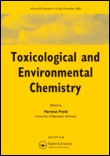
TOXICOLOGICAL AND ENVIRONMENTAL CHEMISTRY
Pioneering research in pollution control and public health.TOXICOLOGICAL AND ENVIRONMENTAL CHEMISTRY is a pivotal journal published by Taylor & Francis Ltd, addressing critical intersections between environmental chemistry and toxicology since its inception in 1979. With its ISSN 0277-2248 and E-ISSN 1029-0486, the journal serves as a platform for rigorous research and innovative methodologies in pollution control, health implications of environmental chemicals, and the broader spectrum of toxicological studies. Although it currently does not offer open access, the journal's impact in the field is underscored by its Category Quartiles rankings in 2023, placing it in Q3 across Environmental Chemistry, Health, Toxicology and Mutagenesis, and Pollution categories. Furthermore, its Scopus rankings reveal its significant role within the scientific community, specifically in areas such as Environmental Science and Toxicology. The journal aspires to foster multidisciplinary dialogue and advance knowledge that contributes to environmental sustainability and public health, making it an essential resource for researchers, professionals, and students dedicated to these fields.

ENVIRONMENTAL SCIENCE AND POLLUTION RESEARCH
Advancing the Frontiers of Environmental KnowledgeEnvironmental Science and Pollution Research is a premier international journal published by Springer Heidelberg, dedicated to advancing knowledge in the field of environmental science and pollution. With an impressive impact factor reflecting its vital contributions to research, the journal is categorized in the top quartiles (Q1 and Q2) across several domains, including Health, Toxicology and Mutagenesis, and Environmental Chemistry. Established in 1994, it continues to be a critical resource for researchers, professionals, and students focusing on pressing environmental issues. The journal provides an insightful platform for disseminating significant findings related to pollution and its effects on health and the environment, contributing to a better understanding and resolution of these challenges. While it currently does not offer Open Access options, its inclusion in prominent rankings, such as the Scopus rankings, underscores its reputation and influence within the scientific community.
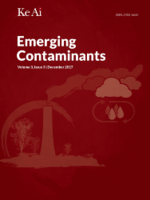
Emerging Contaminants
Uncovering the hidden threats in our environment.Emerging Contaminants is a leading international journal dedicated to the exploration and analysis of novel pollutants, their effects, and the methodologies for their detection and remediation. Published by KEAI PUBLISHING LTD in China, this Open Access journal has been at the forefront of scientific discourse since its inception in 2015, allowing unrestricted access to cutting-edge research. With an impressive categorization in the top Q1 quartile across diverse fields, including Health, Toxicology and Mutagenesis, and Public Health, it ranks remarkably high—41st out of 665 in Public Health and 10th out of 133 in Toxicology according to Scopus metrics, demonstrating its vital role in advancing our understanding of environmental health risks. By bridging the gap between academia and practical applications, Emerging Contaminants not only enriches the scientific community but also serves as an essential resource for policymakers and industry leaders seeking effective solutions to environmental challenges. Researchers, professionals, and students alike are encouraged to engage with the journal’s comprehensive studies and findings, contributing to a sustainable future.

TOXICOLOGY AND APPLIED PHARMACOLOGY
Connecting Research to Real-World ApplicationsTOXICOLOGY AND APPLIED PHARMACOLOGY, published by Academic Press, Inc. Elsevier Science, stands as a leading journal in the domains of toxicology and pharmacology, with its establishment dating back to 1959. With an impact factor reflecting its academic rigor and relevance, this journal is classified in the Q2 quartile for both pharmacology and toxicology categories, underscoring its significance in the scientific community. It ranks #34 out of 133 in Toxicology and #95 out of 313 in Pharmacology according to Scopus, placing it within the 74th and 69th percentiles, respectively. The journal aims to disseminate quality research that drives advancements in understanding the interactions of drugs and toxic substances within biological systems. Researchers and professionals are invited to contribute and engage with a broad spectrum of articles that cover mechanistic studies, risk assessment, and innovative therapeutic strategies. Although the journal does not offer open access, it continues to be a crucial resource for those who seek to navigate the complex interface of drugs and their toxicological implications.